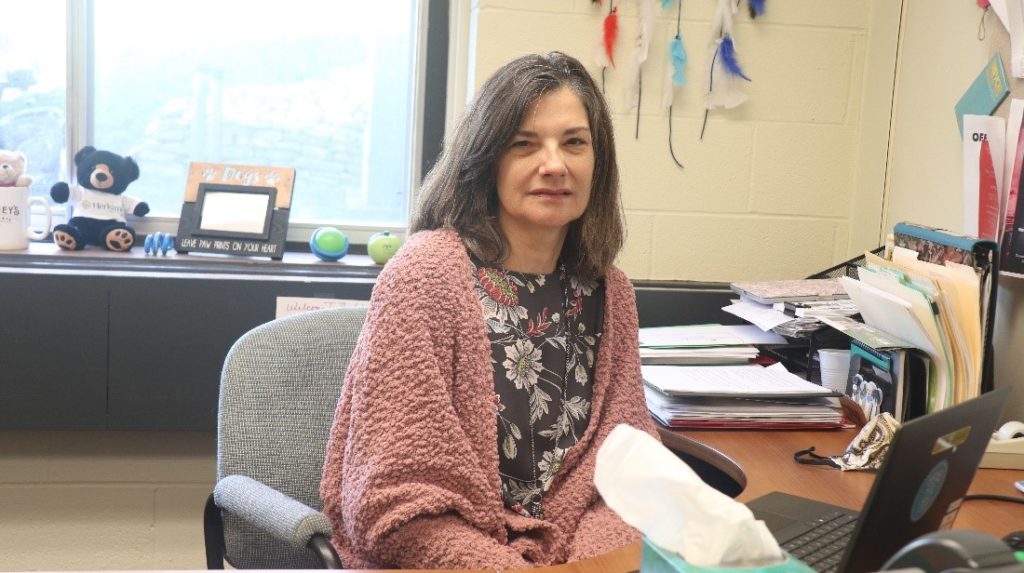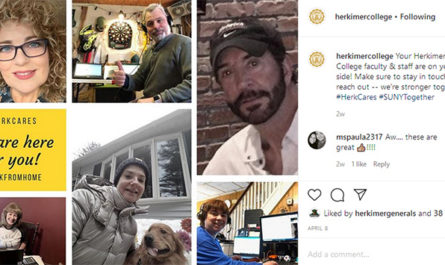To wrap up International Mental Health Awareness Month, I decided to interview counselors at the Herkimer College Counseling Center.
Mary Greene is the handler of the department’s therapy dog, Renegade, facilitates the De-Stress for Success program, and is the advisor of Active Minds. Kaitlyn LaPolla is the facilitator of the wellness and parents support group.
Hopefully, their input on mental health will give you an idea of what you should do to seek help, and why mental health is so important.

Q: When do you believe that someone should seek treatment for mental illnesses? Is there ever a right time?
A: The real question is, “Is there ever a WRONG time?” The right time is anytime that anyone experiences a mental health struggle.
Here at Herkimer College, you can make an appointment to talk to a counselor or you can go to the Counseling Center Resources page and take a screening. The screening will suggest some options for addressing your concern.
Q: What advice would you give to those who think they have a mental disorder, but they are hesitant to seek help?
A: Going for a mental health checkup should be the same as a physical checkup. We need to get rid of the stigma about mental health. Going for a check-up is the smart and right thing to do.
Q: What advice would you give to parents/guardians/other supporters on trying to help the person?
A: Be open to listening, allow the person to talk, be empathetic, and help them get connected to treatment.
Q: In which cases would you recommend a therapy/emotional support animal?
A: That’s a hard one! Animals can be very therapeutic but It depends on the individual. Raising an animal is a huge responsibility. It’s a case-by-case situation.
Q: What can someone do to maintain a stable mental health?
A: Practice self-care, get proper rest, eat right, exercise, and use a social support network. If you’re feeling stress, you should reach out to those who’ll help you.
Q: How much can stress be a trigger for certain mental illnesses? What ways can people de-stress themselves and manage their stress levels?
A: Stress is a trigger for unwellness in general. High stress levels can lead to suffering from increased anxiety.
When stress interferes with everyday activities, it is a sign that we need to address it. How we manage stress is individual. We need to identify our stressors and learn how to manage them in a healthy way. For example, poor time management can be a stressor and learning better time management will help us better manage and be less stressed.
If we use better stress management techniques, we can be better. It’s all about balancing work, leisure/play, and self-care. There is no exact formula for getting rid of stress. Each individual needs to find what works for them.

Q: When do you believe someone should seek treatment for mental disorders? Is there ever a right time?
A: The right time is anytime someone thinks, “I should talk to someone…”
When anyone should seek help, is anytime, not to just wait for a crisis to happen. It can be anytime.
Q: What advice would you give to those who think they have a mental disorder, but are hesitant to seek help?
A: Stay away from the Internet!!
They should go to someone they’re comfortable with and talk to them, whether it’s a teacher, coach, family member, doctor, or anyone.
Q: What advice would you give to parents/guardians/supporters on trying to help the person?
A: To encourage them to figure it out for themselves, and not to do the work for them.
Q: What would you say to those who think certain disorders, such as depression, are a joke or not that serious?
A: Just because there are people who don’t validate the experience, it doesn’t mean it isn’t real.
Q: In what cases would you recommend group therapy/support groups? What are the pros and cons of them?
A: It really depends on the person. Support and therapy groups are effective in helping people see that they’re not alone. Peer support is really valuable.
Pros: normalize experiences, reach more people at once, shared experiences.
Cons: people breaking confidentiality, which rarely happens, and personality dynamics.
Q: What can someone do to maintain a stable mental health?
A: Actively work on it every day, whether in big or small ways.
Nutrition, physical activity, work on personal needs, talk about their experiences, and understand that it’s not a straight line up.
There will be good days and bad days, and they all balance each other out.
To set an appointment or to discuss problems you are having, contact the Counseling Center at [email protected]
For more information on the Counseling Center, and its programs, go to www.herkimer.edu hover over “Campus Life” and click on “Services and Support.”


 by
by 

